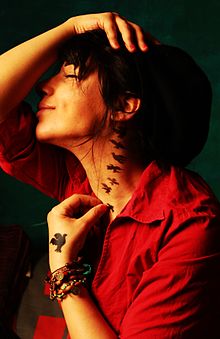|
Nidaa Badwan
 Nidaa Badwan (born 17 April 1987) is a Palestinian artist who was born in the United Arab Emirates. She moved to Gaza when she was in sixth grade, and spent a year working in Amman after completing her fine arts degree at a Palestinian university.[1] CareerBadwan is an artist known for her work 100 Days of Solitude, for which she spent an extended period of time creating a beautiful space in her room where she could isolate herself and escape from reality of Gaza. She says living in a city where she "lost basic rights as a human being" inspired her to "create an alternative world" in her room.[2] This project is composed of 25 photographic self-portraits taken in that room since 13 November 2013 that portray her during her twenty months of self-imposed exile, started after she was abused by members of Hamas in Gaza.[1] She is a graduate of the Fine Arts School of Gaza's Al Aqsa University.[2] Her story, reported in an interview with the New York Times,[1] has made her known internationally, cited by many other newspapers, magazines and television from all over the world (such as ZDF,[3] France24[4] and Sky Arte[5]). After the years of Palestine, she moved to the Republic of San Marino,[6] where she also worked as a university professor at the University of Design of the Republic of San Marino.[7] Now, the artist lives in Italy. Her exhibitions have toured and are touring the world: after the first in Jerusalem, numerous exhibitions in Italy, San Marino, Denmark, Germany, US, Spain, United Arab Emirates. In 2016, she was selected for The 2016 Sovereign Middle East & North Africa Art Prize Finalists, a prize for the 30 best artists in the Arab world.[8] In 2017, she was a speaker at the UNESCO conference held in Carthage (Tunisia).[9] Also in 2017, the municipality of Monte Grimano Terme, Italy, granted Nidaa with a space for herself right in the historical center of this little town, which is inserted in the club "Most Beautiful Villages in Italy". This place will be her "new room".[10] The inauguration took place in the presence of numerous authorities, including the Consul of Palestine in Italy.[11] Notes
External links |